42 found, showing page 1 of 3
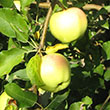
This summer-bearing variety will produce juicy, mildly tart apples in early-mid August. It has showy pinkish-white flowers in the spring and averages at about 12-15' tall and wide. It bears a more abundant crop when pollinated by varieties like 'Red Delicious' and 'Honeycrisp'.
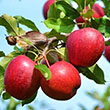
The 'Red Winesap' produces an apple that is both sweet and tangy. The apples are firm and crisp, and they ripen in mid-October. Will average out at 12-15' tall and wide.
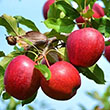
The 'Red Winesap' produces an apple that is both sweet and tangy. The apples are firm and crisp, and they ripen in mid-October. Will average out at 12-15' tall and wide.
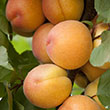
The 'Flavor Delight' aprium is 75% apricot and 25% plum, producing a fruit that is just the right mix of sweet and tangy. These apriums are great for jams, cobblers and fresh eating. Fruits will ripen in mid-July and produce most abundant crop when cross-pollinated. Dwarf variety will average 10-15' tall and wide and can be maintained with pruning.
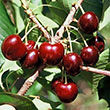
The 'Blackgold' is a semi-dwarf variety that produces delicious, crack-resistant, sweet cherries that are perfect for eating right off the tree. This variety is a great pollinator for other sweet cherry trees and produces consistently large crops of fruit. It will grow 12-15' tall and wide and fruit will ripen in mid-June.
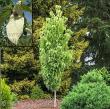
The 'Iseli Fastigiate' dove tree has an extremely uprigt growth habit, reaching 15-25' tall and 12-15' wide. Its striking, white flowers mimic the shape of dove's wings, giving this tree its name.
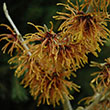
The 'Jelena' produces copper-red blooms in late winter before spring foliage emerges. It will reach 12-15' tall and wide at maturity and its fall foliage is rich green edged with vibrant red and orange.
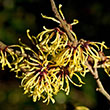
The 'Primavera' is known for its vibrant, fragrant yellow flowers that emerge in early spring before the leaves appear. Green foliage is tinged with yellow and orange in the fall, adding multiple seasons of interest. Will grow 12-15' tall and wide and has an open, spreading habit.
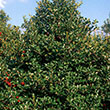
--
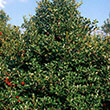
The 'Koehneana' holly is prized for its glossy green leaves and abundant clusters of red berries that persist through the winter. This variety is densely branches and has a pyramidal shape, reaching 20-25' tall and 12-15' wide. The 'Koehneana' is particularly optimal for screening purposes.
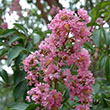
The 'Biloxi' produces large, lavender-pink blooms that persist through the summer. It will reach 15-20' tall and 12-15' wide at maturity. Fall foliage turns orange-red, adding seasonal interest.

The 'Biloxi' produces large, lavender-pink blooms that persist through the summer. It will reach 15-20' tall and 12-15' wide at maturity. Fall foliage turns orange-red, adding seasonal interest.
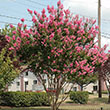
The 'Sioux' is a popular variety known for its large, vibrant-pink, panicle flowers that bloom profusely throughout the summer. This variety will quickly reach 15-20' tall and 12-15' wide. Multi-trunked with a dense, upright growth habit.
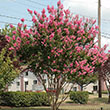
The 'Sioux' is a popular variety known for its large, vibrant-pink, panicle flowers that bloom profusely throughout the summer. This variety will quickly reach 15-20' tall and 12-15' wide. Multi-trunked with a dense, upright growth habit.
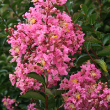
Height: 12 feet
Spread: 10 feet
Sunlight: full sun partial shade
Hardiness Zone: 6b
Other Names: Crape Myrtle, Crepe Myrtle
Description:
Covered with pretty papery panicles of pink flowers; attractive exfoliating bark; heat and drought tolerance; does not like to be over-fertilized
Ornamental Features:
Sioux Crapemyrtle is smothered in stunning panicles of pink frilly flowers at the ends of the branches from early to late summer. It has attractive dark green deciduous foliage which emerges coppery-bronze in spring. The oval leaves are highly ornamental and turn orange in fall.
Landscape Attributes:
Sioux Crapemyrtle is a dense multi-stemmed deciduous shrub with an upright spreading habit of growth. Its relatively fine texture sets it apart from other landscape plants with less refined foliage.
This is a relatively low maintenance shrub, and is best pruned in late winter once the threat of extreme cold has passed. Deer don't particularly care for this plant and will usually leave it alone in favor of tastier treats. It has no significant negative characteristics.
Sioux Crapemyrtle is recommended for the following landscape applications:
- Accent
- Mass Planting
- Hedges/Screening
- General Garden Use
- Container Planting
Planting & Growing:
Sioux Crapemyrtle will grow to be about 12 feet tall at maturity, with a spread of 10 feet. It tends to be a little leggy, with a typical clearance of 2 feet from the ground, and is suitable for planting under power lines. It grows at a fast rate, and under ideal conditions can be expected to live for 40 years or more.
This shrub does best in full sun to partial shade. It prefers to grow in average to moist conditions, and shouldn't be allowed to dry out. It is very fussy about its soil conditions and must have rich, acidic soils to ensure success, and is subject to chlorosis (yellowing) of the foliage in alkaline soils. It is highly tolerant of urban pollution and will even thrive in inner city environments. This particular variety is an interspecific
hybrid.
Sioux Crapemyrtle makes a fine choice for the outdoor landscape, but it is also well-suited for use in outdoor pots and containers. Its large size and upright habit of growth lend it for use as a solitary accent, or in a composition surrounded by smaller plants around the base and those that spill over the edges. It is even sizeable enough that it can be grown alone in a suitable container. Note that when grown in a container, it may not perform exactly as indicated on the tag - this is to be expected. Also note that when growing plants in outdoor containers and baskets, they may require more frequent waterings than they would in the yard or garden.
42 found, showing page 1 of 3